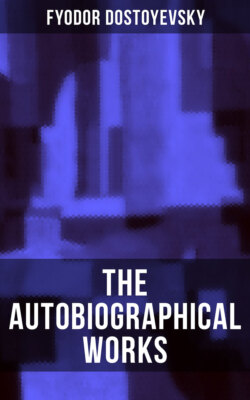Читать книгу The Autobiographical Works of Fyodor Dostoyevsky - Fyodor Dostoyevsky - Страница 16
На сайте Литреса книга снята с продажи.
XI A LITERARY FRIENDSHIP
ОглавлениеTable of Contents
With Pauline N the period of passion in Dostoyevsky's life closed. It lasted altogether but ten years, from the age of thirty-three to that of forty-three. The African love of Maria Dmitrievna and the somewhat Oriental passion of Pauline N had left no very pleasant memories, and in his maturity my father returned to the Lithuanian ideals of his forefathers. He began to seek for a pure and chaste young girl, a virtuous woman, who would be a faithful life companion. His two later romances were romances of the affections, and not of the senses. Let us consider the first of these.
At the period in question a rich landowner, M. Korvin-Kronkovsky, was living in the heart of Lithuania. He belonged to the Lithuanian nobility, and claimed to be a descendant of Corvinus, the somewhat mythical King of heathen Lithuania. He was married and had two daughters whom he had educated very carefully. The younger of the two, Sophie, afterwards married M. Kovalevsky, and was Professor of Mathematics at the University of Stockholm, the first woman who had been admitted to such a position.55
55 At the time of which I am writing Sophie was but fourteen, and she played no part in Dostoyevsky's life.
The elder, Anna, a pretty girl of nineteen, preferred literature. She was a great admirer of my father's, and had read all his works. The novel Crime and Punishment made a great impression upon her. She wrote Dostoyevsky a long letter about it which pleased him very much. He rephed promptly, and a correspondence followed, which extended over some months. Anna then begged her father to take her to Petersburg that she might make the acquaintance of her favourite writer. The whole family arrived in Petersburg and took a furnished flat. They at once invited my father to visit them, and were charming to him. Dostoyevsky was often at their hospitable house, and finally made an offer of marriage to Anna Kronkovsky. He was a widower, and tired of living alone. Maria Dmitrievna had accustomed him to a well-kept home and the material comfort only a woman can give to a house. He longed for children, and recognised with terror that he was leaving the years of his youth behind him. He was not in love with Anna, but he liked her as a well-brought-up, lively and amiable girl. Her Lithuanian family pleased him. Mile. Kronkovsky, on her side, did not love my father, but she had a great admiration for his talent. She consented joyfully to become his wife, but their engagement was, nevertheless, very brief. Their political opinions differed widely. Dostoyevsky was becoming more and more a Russian patriot and a monarchist; Anna Ejonkovsky was a cosmopolite and an anarchist. As long as they talked literature, all was well; but as soon as they got on to political questions they began to quarrel and dispute. This often happens in Russia, where people have not yet learnt to talk politics calmly. The betrothed couple saw in time that their marriage would be an inferno, and they determined to break off their engagement. But they were not so ready to give up their friendship. After returning to the country, Anna continued to write to my father, and he replied as before. The following winter the Kronkovskys came to Petersburg again, and Dostoyevsky was once more a frequent visitor at their house. My father's affection for Mile. Kronkovsky was at bottom but a literary friendship as necessary to a writer as love itself. When Dostoyevsky became engaged to my mother, Anna Kronkovsky was the first to congratulate him heartily. Shortly after his marriage, she went abroad with her parents and met in Switzerland a Frenchman, M. J. , an anarchist like herself. They spent delightful hours together, destroying the whole world and reconstructing it on more harmonious lines. This occupation was so congenial to both that they ended by marrying. An opportunity for putting their anarchist theories into practice soon presented itself. The Franco-Prussian war broke out, Paris was besieged, and the Commune established. The two J 's took an active part in its proceedings. After having set fire to a precious art collection, which it was apparently necessary to destroy for the good of humanity, Madame J fled from Paris. Her husband was arrested and imprisoned. Moved by the despair of his daughter, who adored her husband, M. Korvin-Kronkovsky sold part of his estate and went to Paris, where he managed to procure his son-in-law's escape by spending 100,000 francs. For a long time the couple could not return to France. They settled at Petersburg, where Madame J continued to be my father's friend. Out of consideration for his former fiancie, Dostoyevsky received her Communard husband cordially, though he had nothing in common with him, Madame J in her turn became a friend of my mother's. Her only son, Georges J , was one of my childish playfellows.
I think my father portrayed Mile, Kronkovsky in Katia, Dmitri Karamazov's fiancee. Katia is not Russian; she is a true Lithuanian girl, proud, chaste, and holding lofty ideas as to family honour, sacrificing herself to save that of her father, faithful to her engagement and to her mission of saving Dmitri Karamazov by correcting the faults of his character. Russian girls are much simpler. Oriental passion or Slav pity triumphs over all other considerations with them.
